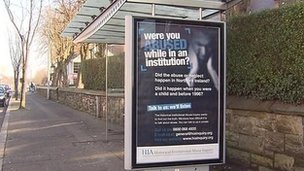
By Sarah Mac Donald - 30 January, 2014
 “The truth is setting me free today more than this commission knows,” said a former resident of an orphanage at Termonbacca in Derry, giving evidence to Northern Ireland’s Historical Abuse Inquiry.
“The truth is setting me free today more than this commission knows,” said a former resident of an orphanage at Termonbacca in Derry, giving evidence to Northern Ireland’s Historical Abuse Inquiry.
“I have come here to tell the truth and as I am reaching out, I am reaching out in healing and trying to forgive but at this moment I cannot.”
Yesterday was the third day of evidence where former inmates of the homes in Northern Ireland related their harrowing stories of psychological, sexual and physical abuse.
The Historical Abuse Inquiry, which is being held in Banbridge, began with opening statements on 13th January. It is investigating abuse claims against children’s residential institutions from 1922 to 1995. A total of thirteen residential institutions are being investigated by the inquiry, which is chaired by Sir Anthony Hart. So far it has received statements from 49 ex-residents of the two homes, but in all 434 people have contacted the inquiry to allege they were abused as children.
This week the focus has been on two homes in Derry, Nazareth House Children’s Home and St Joseph’s Home, Termonbacca both run by the Sisters of Nazareth.
At the start of the inquiry, apologies were read out by lawyers representing the Sisters of Nazareth and the De La Salle Brothers for the abuse suffered by children in their homes.
Yesterday a sixty five year old man gave evidence for an hour and a half. He told how he had siblings, five sisters who were in a nearby home, but who he did not know existed. At night he slept in saturated, urinated pyjamas to protect himself from abusers – older boys who were monitors. He said when he did not wet the bed by accident, he would do so on purpose to protect himself from the paedophiles.
He ended his testimony yesterday saying “I hope there will be vindication. These institutions were left to their own devices.”
Testimony from the former residents over the past week has been harrowing and upsetting, with some breaking down and having to take a break from giving evidence.
Another witness said he was known at the home by his ID number. He said he was beaten repeatedly and habitually. Telling the inquiry of his time at the home, was “a day of freedom” he said, adding that through the inquiry he had met one of his brothers for the first time in decades.
“Looking into the eyes of my eldest brother – he threw his arms around me and we cried. They killed our family. I saw the face of man I dread to think what he must have endured because I was there at the same time.”
One witness referred to the sisters as the ‘Taliban’, such was their cruelty, but he said some nuns were very kind as were paid workers there.
Instances of abuse described at the hearings included:
Some of the institutions under investigation by the Historical Abuse Inquiry were run by state authorities, others by voluntary organisations and the remainder were operated by the Catholic Church.
The Public hearings of the Inquiry are due to finish in June 2015. The team is then to report to Stormont’s power-sharing Executive by the start of 2016.
The Historic Abuse Inquiry does not have the power to find anyone guilty of a criminal offence, but if it does uncover evidence of criminality, the details will be reported to the police.
by Susan Gately